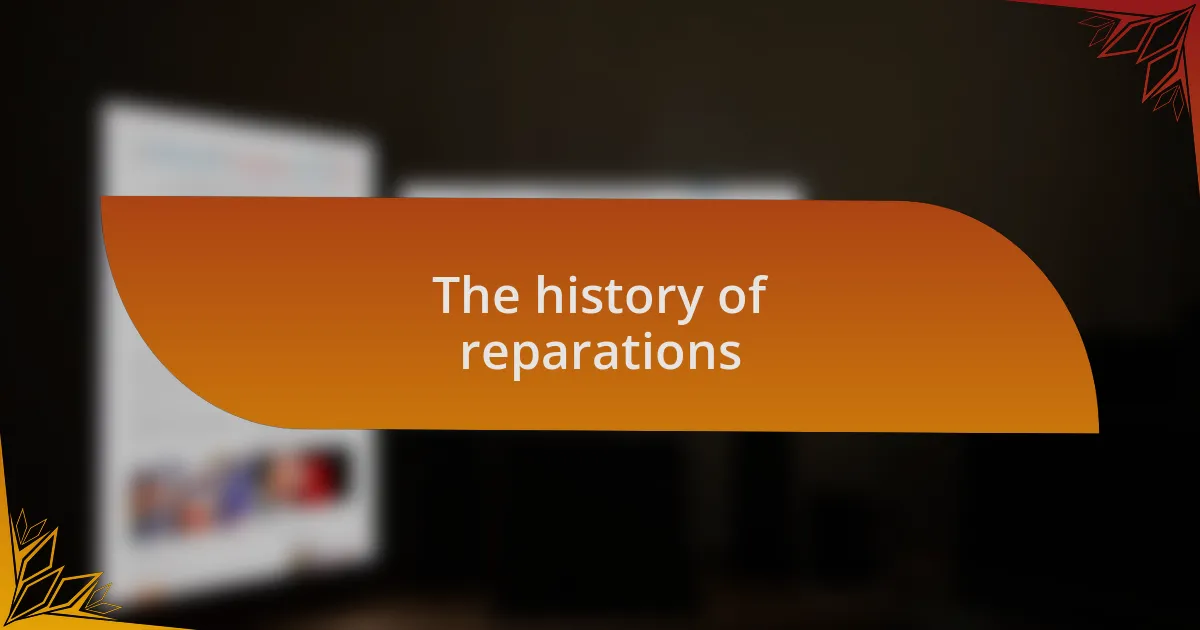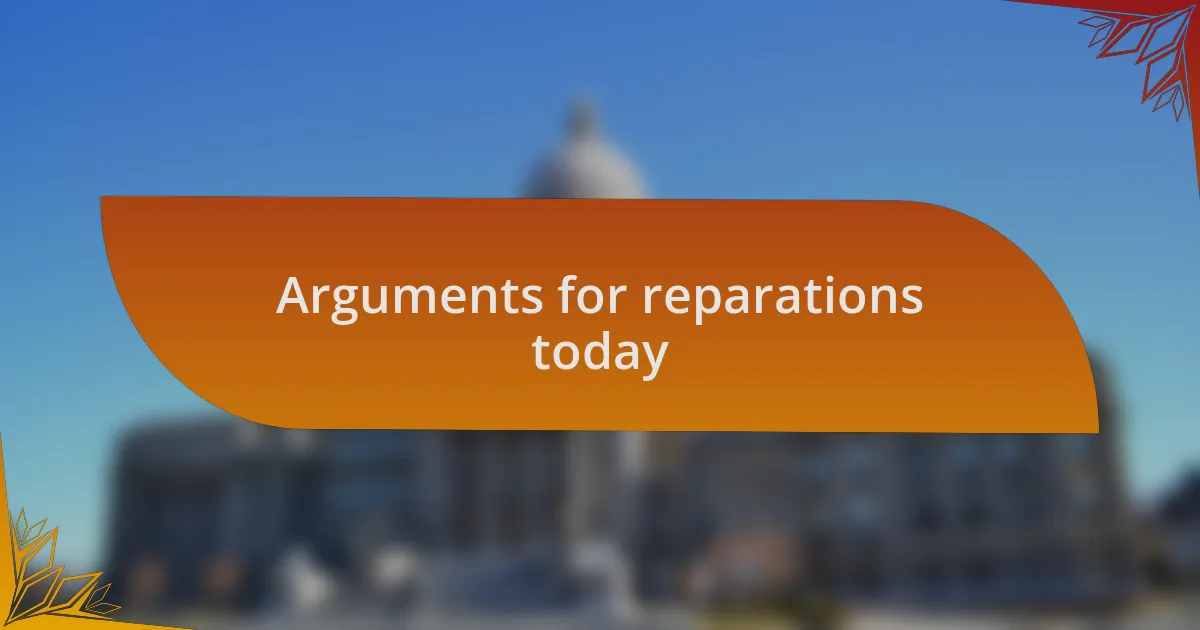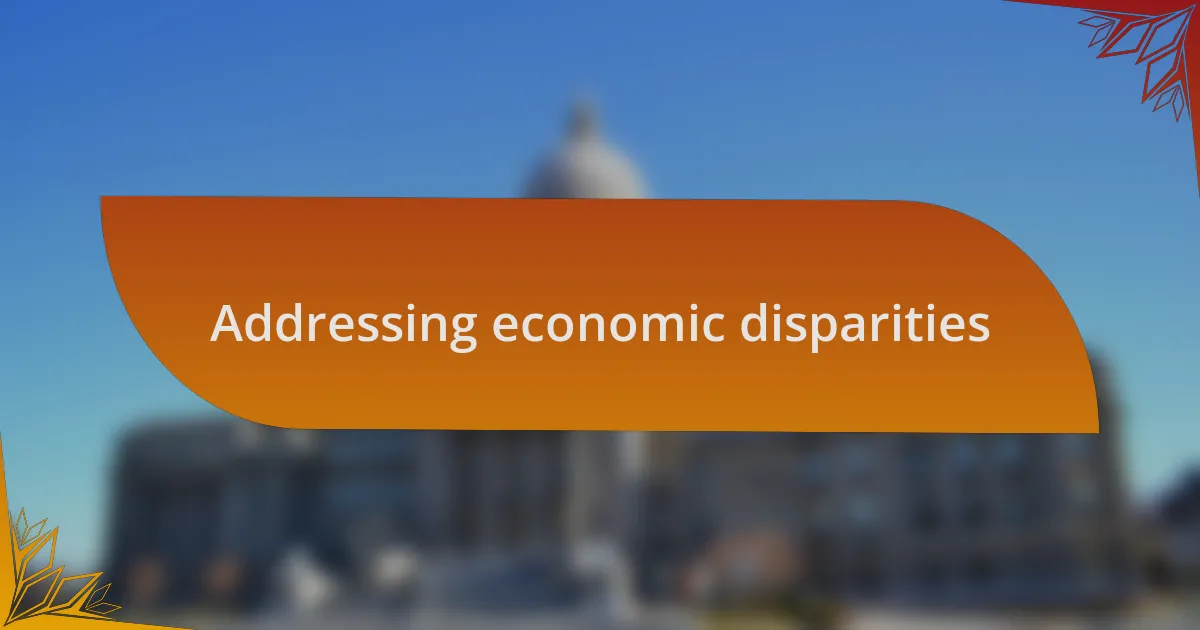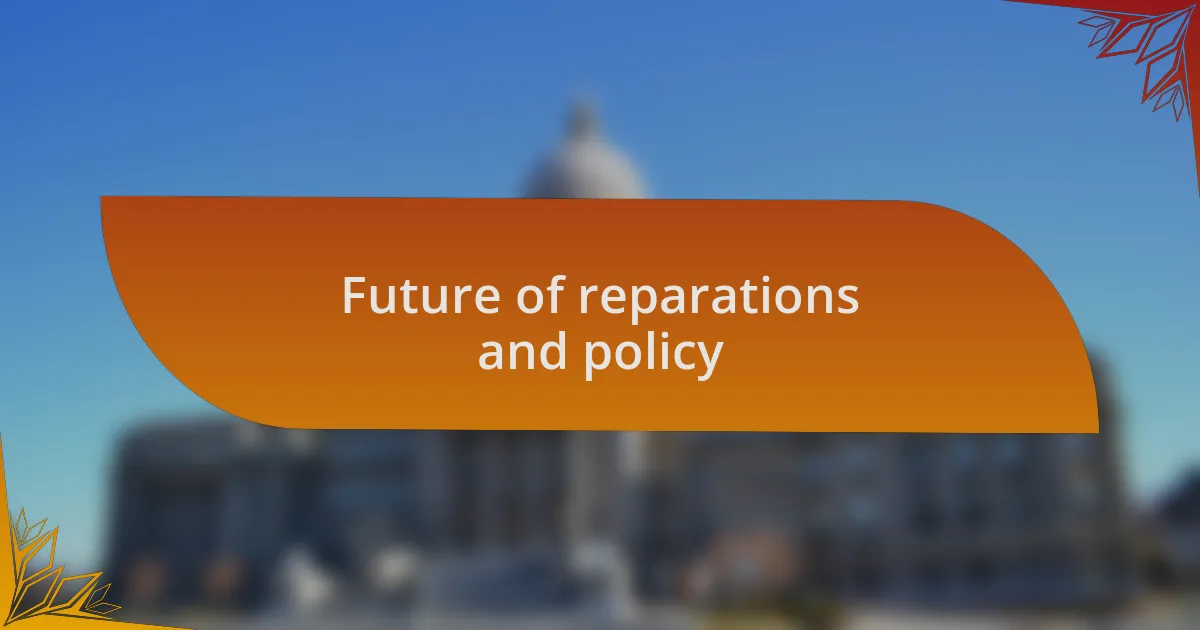Key takeaways:
- Reparations politics encompasses historical grievances and modern demands, focusing on acknowledgment of harm and pathways for healing.
- The history of reparations in the U.S. dates back to post-slavery efforts and has evolved through movements advocating for justice and recognition.
- Current economic policies aim to address systemic inequalities, with local initiatives exploring reparative measures like support for Black-owned businesses.
- Future reparations should integrate investment in community infrastructure and focus on sustainable development, promoting empowerment alongside financial compensation.

Understanding reparations politics
Reparations politics is a complex arena filled with historical grievances and contemporary demands. When I think about the long-lasting effects of systemic racism, I can’t help but remember conversations I’ve had with friends who recount their family histories; these stories illustrate how past injustices continue to resonate today. Have you ever considered how generational trauma influences an entire community’s economic mobility?
The dialogue surrounding reparations often brings forth varying opinions on what compensation should look like—monetary payments, social services, or land restitution, for instance. From my perspective, it’s essential to recognize that reparations aren’t just about financial compensation; they’re about acknowledging harm and fostering pathways for healing. Have you ever thought about what a true reparative justice might entail beyond just checks being written?
It’s also crucial to understand how economic policies intersect with reparations. In my exploration of this topic, I find that policies designed to uplift marginalized communities can reflect a form of reparative action. When I see initiatives that prioritize educational opportunities and job training, I wonder—could these be critical stepping stones toward a more equitable society? Exploring these connections enhances our grasp of reparations politics and its broader implications.

The history of reparations
The concept of reparations has deep historical roots, dating back to the aftermath of slavery. In the United States, one of the earliest mentions can be traced to General William Tecumseh Sherman’s Special Field Order 15 in 1865, which aimed to provide land to freed Black families. Reflecting on this, I often think about the symbolic significance of that order—what if it had been fully enacted? Would we see a different economic landscape today?
Fast forward to the 20th century, discussions on reparations resurfaced, especially after the civil rights movement. Groups like the National Coalition of Blacks for Reparations in America (N’COBRA), founded in 1987, made the case for formal recognition of wrongs done and the need for reparative justice. It amazes me how the fight for recognition has evolved over decades—what drives individuals to persist in such an uphill battle?
As I delve deeper into the history of reparations, I can’t help but consider global perspectives, such as Germany’s reparations to Jewish survivors of the Holocaust. These cases raise essential questions: How can reparations be applied in a way that genuinely addresses past wrongs? What lessons can we glean from other nations’ experiences to inform our strategies today?

Current economic policies overview
Current economic policies play a crucial role in shaping the landscape for reparations and addressing historical injustices. Today, policies such as universal basic income, wealth redistribution through taxation, and targeted investment in marginalized communities aim to tackle systemic inequalities. I often wonder how these initiatives might complement reparations, creating a more equitable environment for future generations.
In recent years, some states and municipalities have begun exploring reparative measures within their economic strategies. Programs that provide grants for Black-owned businesses and support for education are steps in the right direction, fostering economic empowerment. It’s intriguing to consider—could these local efforts set a precedent for national policies, ultimately leading to a broader acceptance of reparations as a necessary economic policy?
As I observe the evolving policies, I can’t escape the feeling that more robust economic frameworks are necessary to truly rectify systemic issues. Even with initiatives aimed at uplifting marginalized groups, I ask myself: Are we doing enough to level the playing field? Collaboration between economic policies and reparative justice is essential, and I believe exploring that intersection could yield promising pathways toward equity.

Arguments for reparations today
One of the strongest arguments for reparations today lies in the undeniable economic disparities that persist due to historical injustices. For instance, I’ve seen firsthand how Black families often struggle with wealth accumulation, facing barriers to home ownership and access to quality education. Just think—if we acknowledged these systemic barriers through reparations, wouldn’t it provide a concrete way to mitigate the economic gaps that have been generations in the making?
Furthermore, reparations can act as a catalyst for comprehensive economic revitalization in affected communities. I remember attending a local event where a reparations initiative was discussed; the energy was palpable. Community members expressed how targeted investments could lead to job creation and improved infrastructure—creating a ripple effect of opportunity. Could it be that reparations not only acknowledge the past but also build a brighter economic future for everyone?
Lastly, reparations are not just about financial compensation; they symbolize recognition and accountability for historical wrongs. Reflecting on a discussion I had with a friend about reparative measures, they highlighted how acknowledgment itself can heal societal wounds. If people truly feel seen and valued, could that foster greater trust and collaboration between communities? By acknowledging the role of reparations today, we open up pathways for dialogue and, ultimately, a more inclusive economic policy framework.

Addressing economic disparities
Addressing economic disparities requires a nuanced understanding of both historical context and current realities. I recall a conversation with a colleague who grew up in a neighborhood impacted by systemic disinvestment. Their stories painted a vivid picture of how limited access to resources can stifle dreams and opportunities for entire generations. Isn’t it eye-opening to think that these economic disparities are not merely statistics or distant issues, but real lives shaped by unjust circumstances?
Moreover, when I think about community investment strategies, I can’t help but reflect on a local initiative that aimed to restore a dilapidated area. The success of that project showed how strategic funding can revive not just buildings but the hopes and aspirations of residents. If we targeted reparations to support such initiatives, could we create an environment where economic disparities begin to dissolve? It seems plausible that with focused effort, we could turn the tide for communities long overlooked.
It’s also important to acknowledge that addressing economic disparities isn’t just a matter of money; it’s about fostering a sense of empowerment. During a recent community forum, someone shared how financial literacy programs made a tangible difference for them and their family. This experience highlighted the need for educational resources alongside financial compensation. When people are equipped with knowledge and tools, don’t they have a better chance at breaking the cycle of poverty? Through thoughtful reparative measures, we can tackle these deep-rooted inequalities and work towards a more equitable future.

Personal reflections on reparations
Reflecting on the notion of reparations, I often think about my own family’s history. My grandparents immigrated to this country seeking better opportunities, yet they faced barriers that shaped their experience. It strikes me that the legacy of privilege they gained, while not directly tied to reparations, opens a dialogue on how historical injustices still ripple through different communities today. Could acknowledging these disparities foster a deeper understanding among us?
One moment that stands out to me was when I attended a panel discussion featuring activists advocating for reparations. Their passionate stories were not just about past grievances but also about hope and change for future generations. I couldn’t help but feel a connection to their struggles, considering how systemic inequities have culminated in a collective longing for justice. Does this not challenge us to think about our roles in this movement?
There are days when I feel overwhelmed by the debate surrounding reparations; it seems so complex. However, I am reminded of a friend’s experience with their local reparative justice program, which empowered underserved communities to reclaim their narratives. This personal connection offers a fresh perspective, leading me to believe that reparations could serve as a tool for healing, rather than simply a financial transaction. Isn’t it worth exploring how such measures could foster unity and understanding among diverse groups in our society?

Future of reparations and policy
The future of reparations and economic policy requires a thoughtful integration of various approaches. I have been reflecting on how policies could shift not just towards monetary compensation but also into investing in community infrastructure. For example, imagine a world where reparations are directed toward education and healthcare for underrepresented communities. Wouldn’t that create lasting impact that goes beyond temporary financial relief?
As discussions evolve, it’s crucial to consider the role of legislation in shaping reparative efforts. I remember attending a community meeting where policymakers emphasized the importance of equitable policy-making. It was eye-opening to hear how small changes in zoning laws could promote economic growth in historically marginalized neighborhoods. What if similar innovative measures were at the core of a national reparations strategy?
Looking ahead, my hope is that reparations will encapsulate a broader vision for economic policy that includes restorative justice at its heart. During a recent conversation with a friend working in urban development, they described projects aimed at revitalizing neighborhoods without displacing residents. Shouldn’t the future of reparations prioritize not just the acknowledgment of injustices but also sustainable development that fosters community resilience? This perspective could illuminate pathways toward collective healing and empowerment.